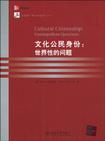文化公民身份
出版时间:2010-3 出版社:北京大学出版社 作者:尼克·史蒂文森 页数:176
Tag标签:无
前言
媒介是神奇的,社会也是神奇的,媒介与社会的耦合生产出无限的神奇。从涂尔于的《宗教生活的基本形式》关于“社会”与唤起社会意识的符号与仪式共生的理论来看,媒介使社会显得神奇的过程也造就了自身的神奇。 人类在现代大众传播成为现实之前对于“神奇”的感知是经由巫师及其巫术的转化来实现的。澳洲土著在图腾舞蹈的狂热中感受到超个人的社会力量的存在。满身披挂的萨满用舞蹈和神歌请灵降神,让已经消逝的显露原形,让凡人通常不可见的显现真身,让千山万水之遥的即刻大驾光临。借助巫术,时间和空间的障碍可以暂时克服,过去的、未来的都可以在现实中出现,墓室中的、仙山上的都可以召唤到面前。 这些神奇经验在现当代越来越彻底地被大众媒介所造就,电视、网络等图像传输技术在其中发挥着关键作用。大人物像变戏法一样总跑到百姓居室内高谈阔论,历史的亡灵在荧屏上招之即来,挥之即去。媒介使常人具有千里眼、顺风耳,看见那原本遥不可见的,听清那从前根本就听不到的。媒介是神奇的,它在社会中的运行有如巫术。几百年的现代化对世界“祛魅”,结果我们看到人类社会所集聚的全部的“魅”都汇聚于媒介,并被媒介无限放大。 长期耳濡目染,媒介的神奇人们已经习以为常了,就像前现代的人对巫术习以为常一样。但是,这个过程一直都是知识界探讨的课题。现代大众媒介的各种新形式从一开始出现的时候就会被知识界作为新事物加以关注。从较早的照相、无线电广播到电影、电视,再到近年的新媒介传播,关于大众传媒研究、文化研究、虚拟社会研究的知识生产就一直紧随媒介发展的步伐。媒介研究在发达国家已经形成庞大的群体和细密的分工,这个群体既能够追逐传播领域的新事物,也能够通过专业的眼光让人们习以为常的许多方面显出怪异来,从而引发众人的注意和分析的兴趣。我们国内的媒介研究在这两个方向上都需要培育自己的能力。
内容概要
为什么“文化”成为政治争论的核心? 在信息时代,我们应该如何重新思考公民身份的问题? 什么是世界主义?它会成为未来的基本典范吗? 本书将身份、个性化、文化多元主义与调解纳入文化政治学的研究范畴,从政治学理论、文化研究和社会学的争论中借鉴经验,集中讨论了如下问题: ·全球化引致的公民身份重塑 ·新社会运动 ·民族-国家的衰落 ·流行文化的冲击 史蒂文森认为,世界主义的问题越来越有可能出现在这些领域。无论我们在讨论环境破坏,还是文化政策、城市、消费者文化的议题,这些问题都可能与世界主义的维度有关。权利、义务和文化方面的议题如今都已成为我们思考这个世界的中心内容。这本原创性的著作提请我们重新思考什么样的政治和人格才是适应信息时代的。
作者简介
尼克·史蒂文森(Nick Stevenson)英国诺丁汉大学社会学与社会政策学院高级讲师,著有《文化、意识形态和社会主义》(1995)、《媒介的转型》(1999)、《文化与公民身份》(2001)、《读懂男性杂志》(与彼得·杰克逊和凯特·布鲁克斯合著)(2001)、《理解媒介文化》(2002)等著作。
书籍目录
SERIES EDITOR'S FOREWORD ACKNOWLEDGEMENTS INTRODUCTION 1 CULTURAL CITIZENSHIP T.H. Marshall and Raymond Williams: a cultural citizenship? Cultural citizenship in the information age The culturation of citizenship Civil society, culture and public space Identity, difference and cultural politics The challenge of individualization Conclusion Notes Further reading 2 COSMOPOLITAN AND MULTICULTURAL CITIZENSHIP: WORLD, NATION, CITY AND SELF Disarmament and European cosmopolitanism The new political cosmopolitans National citizenship: liberalism and multiculturalism Multicultural citizenship: Iris Marion Young, Will Kymlicka and Bhikhu Parekh Cosmopolitanism and multiculturalism The city as a contested space Cosmopolitan cultures and cosmopolitan selves Conclusion Notes Further reading 3 ECOLOGICAL AND CULTURAL CITIZENSHIP: ACROSS THE NATURE/CULTURE DIVIDE Culture and nature Cosmopolitan and ecological citizenship Modernity, progress and consumption Risk, science and democracy Cinematic representations of risk: Safe Cyborg relations: humans, animals and technology Vulnerability, voice and community Conclusion Note Further reading 4 MEDIA, CULTURAL CITIZENSHIP AND THE PUBLIC SPHERE Media, citizenship and cultural power Cultural citizenship in a global mediated culture Human rights, social movements and global media Technocultures, media and community Speed and communication Moral indifference and cosmopolitanism Media, popular culture and the deconstruction of public and private Conclusion Note Further reading 5 CONSUMERISM, CULTURAL POLICY AND CITIZENSHIP Consumer culture and the death of citizenship Consumer culture as citizenship Questions of cultural capital Cultural policy and questions of governance A 'common' cultural citizenship Conclusion Further reading 6 CULTURAL CITIZENSHIP: A SHORT AGENDA FOR THE FUTURE GLOSSARY BIBLIOGRAPUY INDEX
章节摘录
But crucially involves the direct intervention of ethical communities,feminist campaigners, green networks, religious denominations, trade unions,ethnic organizations and parents groups. A society-wide conversation isdependent upon the emergence of an energetic civil society that is able to forceissues and perspectives on to a public agenda. A robust civil society ensures thatthe communicative basis of society never becomes completely colonized byagencies of money and power. Civil society, then, under certain circumstances,is able to convert itself into communicative power through the channels ofpublic communication and the activation of public normative sentiment. Forthe public sphere to be socially just, it must both prevent the manipulation ofthe public by forces with vested interests in social control and pull togetheran otherwise fragmented public. A widespread, publicly inclusive conversationwould shatter attempts at information processing strategies and replace themwith genuinely communicative interests and passions. A communicative civilsociety would produce a cultural citizenship where the public were capable oflearning from one anothers viewpoints. The creation of a robust civil society is, however, constantly threatened by thecolonizing capacity of money and power. According to Benjamin Barber (2001)there are at least three dangers to the creation of an engaged civil society.The first is the bureaucratic mechanisms of government that seek to manageand limit public criticism. These can emerge through hegemonic strategiesof incorporation and exclusion, censorship and the division of oppositionalsentiments. The second is the belief that markets promote democratization.Markets tend to promote individualistic goals and choices, limiting our capacityto deliberate upon the common good. Finally, civil society is threatened by ayearning for undifferentiated and homogeneous communities. Whereas marketsfoster individual yearnings, they unintentionally promote unsatisfied desires forcommunal solidarity. This promotes a basic ambivalence where the thinner the markets social nexus, the thicker and more bloody the response to it (Barber2001: 272). Hence, whereas Barber does not press this point, any analysis of a genuinely civil society would need to investigate the construction of cultural identity. The problem here is that Habermas rarely takes these questions as seriously as he might. More recently, Habermas (2001) has argued that in an age where the state is continually permeated by global flows of money and power, only the develop- ment of a genuinely global civil society and public sphere will foster the development of cosmopolitan solidarity. The impact of economic globalization has shifted the locus of control from the states regulation of territory to the imperatives of speed capitalism. These developments (among others) have shaken the idea of the nation being the basis for civic solidarity.
图书封面
图书标签Tags
无
评论、评分、阅读与下载
用户评论 (总计2条)
- 可与中文翻译本对照阅读
- 深刻!
